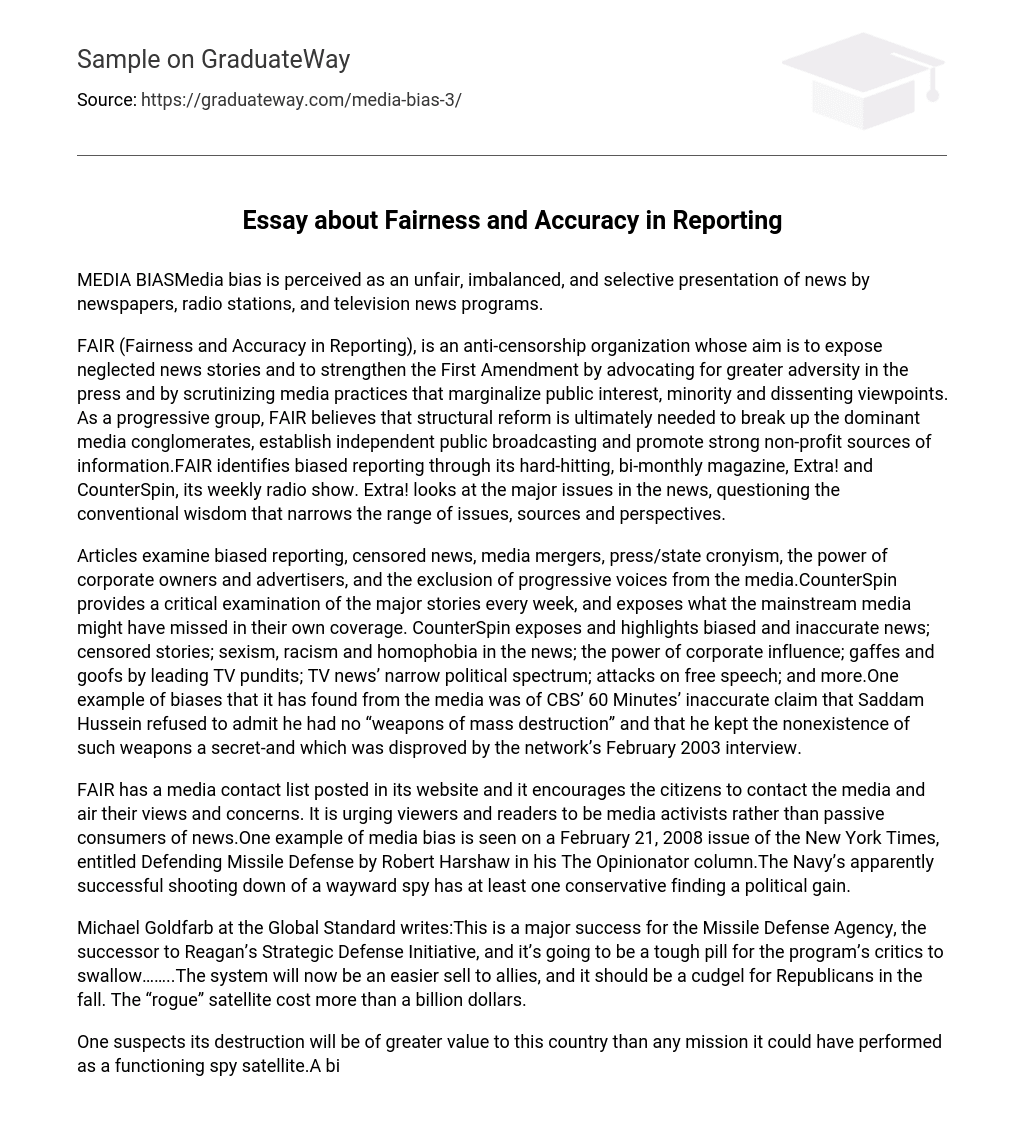MEDIA BIASMedia bias is perceived as an unfair, imbalanced, and selective presentation of news by newspapers, radio stations, and television news programs.
FAIR (Fairness and Accuracy in Reporting), is an anti-censorship organization whose aim is to expose neglected news stories and to strengthen the First Amendment by advocating for greater adversity in the press and by scrutinizing media practices that marginalize public interest, minority and dissenting viewpoints. As a progressive group, FAIR believes that structural reform is ultimately needed to break up the dominant media conglomerates, establish independent public broadcasting and promote strong non-profit sources of information.FAIR identifies biased reporting through its hard-hitting, bi-monthly magazine, Extra! and CounterSpin, its weekly radio show. Extra! looks at the major issues in the news, questioning the conventional wisdom that narrows the range of issues, sources and perspectives.
Articles examine biased reporting, censored news, media mergers, press/state cronyism, the power of corporate owners and advertisers, and the exclusion of progressive voices from the media.CounterSpin provides a critical examination of the major stories every week, and exposes what the mainstream media might have missed in their own coverage. CounterSpin exposes and highlights biased and inaccurate news; censored stories; sexism, racism and homophobia in the news; the power of corporate influence; gaffes and goofs by leading TV pundits; TV news’ narrow political spectrum; attacks on free speech; and more.One example of biases that it has found from the media was of CBS’ 60 Minutes’ inaccurate claim that Saddam Hussein refused to admit he had no “weapons of mass destruction” and that he kept the nonexistence of such weapons a secret-and which was disproved by the network’s February 2003 interview.
FAIR has a media contact list posted in its website and it encourages the citizens to contact the media and air their views and concerns. It is urging viewers and readers to be media activists rather than passive consumers of news.One example of media bias is seen on a February 21, 2008 issue of the New York Times, entitled Defending Missile Defense by Robert Harshaw in his The Opinionator column.The Navy’s apparently successful shooting down of a wayward spy has at least one conservative finding a political gain.
Michael Goldfarb at the Global Standard writes:This is a major success for the Missile Defense Agency, the successor to Reagan’s Strategic Defense Initiative, and it’s going to be a tough pill for the program’s critics to swallow……..The system will now be an easier sell to allies, and it should be a cudgel for Republicans in the fall. The “rogue” satellite cost more than a billion dollars.
One suspects its destruction will be of greater value to this country than any mission it could have performed as a functioning spy satellite.A billion dollars well spent, then? The government may have spent billions of dollars on missiles, but how about those people who are dying from hunger? That amount could be a big help had they spent it on a program to fight hunger. How about the debris that will enter the earth’s atmosphere as a result of the shooting down of the satellite?A functionalist may agree that spending billions of dollars on warfare is justifiable considering the possible future threat on national security. However, a conflict sociologist may not agree with the program.
He may argue that it is a way for the United States to emphasize its influence and power over other nations.REFERENCE Fairness and Accuracy in Reporting. 21 February 2008. < http://www.
fair.org.>Harshaw, Robert. The Opinionator: Defending Missile Defense.
New York Times. 21 February 2008. 21 February 2008. < http://www.nytimes.com.>





